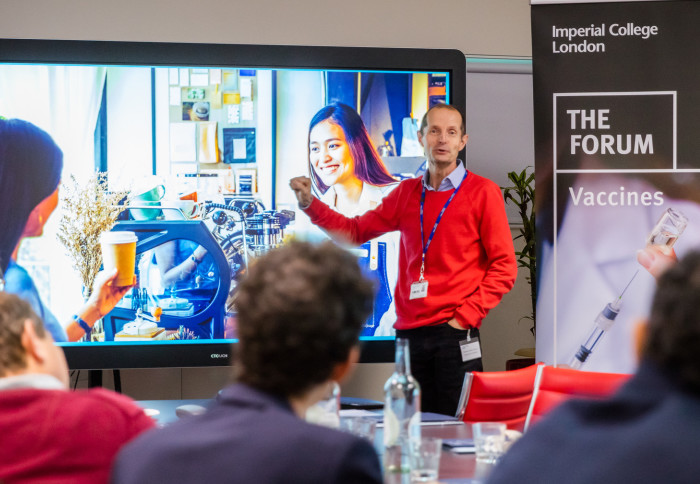UK must invest to keep up with RNA vaccine revolution – Robin Shattock
by James Rae, George Hope

Professor Shattock presents to policymakers at a Forum workshop in 2019
Professor Robin Shattock says the UK needs to invest more in RNA vaccine technology to better prepare us for future pandemics.
Speaking at a panel event jointly organised by The Forum, Imperial’s policy engagement programme, and the Institute for Government, Professor Shattock compared the massive investment in other countries into RNA technology with the UK's track record, arguing that we have been losing ground in what he called a 'potential revolution'.
Professor Shattock, who leads a team at Imperial focusing its RNA vaccine technology to target SARS-CoV-2 mutations, boosters and thermostability, was joined on the panel by George Freeman, MP for Mid Norfolk and former Minister for Life Sciences, Tom Chivers, author and Science Editor at Unherd and Dr Rebecca Fisher, GP and Senior Policy Fellow at The Health Foundation.
Professor Shattock said that we should be wary of missing the potential of RNA technology, which is the basis of the Pfizer/BioNTech vaccine, noting significant investment in the technology in the United States and Germany.
The technology uses genetic code - self-amplifying RNA - rather than the virus itself to fight coronavirus. The genetic code carries instructions to make a protein found on the outside of the virus called the spike protein. Once injected into the muscle of the arm, the cells make this spike protein, enabling the immune system to generate defences against the virus.
We are missing an opportunity in the UK - we haven't been as astute at investing in RNA technology. Professor Robin Shattock Imperial College London
Professor Shattock highlighted that RNA technology has already proven its value in combatting COVID-19 by cutting the cost and development time of vaccines significantly, and having a significant RNA capability in the UK will better prepare us for future pandemics.
George Freeman, MP for Mid Norfolk and former Minister for Life Sciences, who is currently advising the Prime Minister on regulatory reform, agreed with Professor Shattock on the importance of the UK government investing in RNA technology and the wider life sciences sector.
Mr Freeman continued by saying that there is a need for more sustained and wider funding of the sector, by using pension fund investments and vaccine ISAs to bring the investment that the sector needs.
The COVID-19 crisis has been one of the most challenging periods for our health care system, said Mr Freeman, and the crisis must act as a catalyst for change in our healthcare system, from integrating health and social care, to placing biosecurity and health economics as top government priorities.
Managing variants

On the topic of the potential threat from current and future coronavirus variants, Professor Shattock said that the number of variants is quite controllable with vaccine technology. Some approved vaccines work better against particular variants than others, he explained, so we can choose which to roll out and when.
Professor Shattock's team is currently focusing its RNA vaccine technology to target mutations, boosters and thermostability rather than an immediate efficacy trial. The team aims to develop the ability to respond rapidly if vaccine-resistant strains emerge, or the need for booster vaccines arises.
The team has also developed approaches that could enable RNA vaccines to be stored in ordinary refrigerators rather than the extremely low temperature required for current RNA vaccines.
Science writer Tom Chivers noted how well set up the UK is for detecting variants due to being a world leader in genetic sequencing. He said that it is relatively straightforward to repurpose vaccines to new variants, arguing that the pivotal question is how well the UK will prevent new variants coming into the country at the border.
Vaccine confidence and misinformation
Dr Rebecca Fisher, a GP in Oxford and Senior Policy Fellow at the Health Foundation, argued that the crisis has accentuated shortcomings in our current health system, whilst also showing many of its strengths.
Dr Fisher noted that the death rate from COVID-19 in black patients is four times higher than in white patients, but white people are the most likely group to receive the vaccine and black people are the least likely. She noted that this reveals structural problems in society, with such disparities not occurring by chance.
Dr Fisher noted that we need to urgently address both what information disadvantaged communities should be receiving, as well as who needs to be delivering such information.
The Forum: Connecting our researchers with policymakers
 The Forum is Imperial College London’s policy engagement programme, connecting Imperial researchers with policymakers to discover new thinking on global challenges. Please get in touch if you would like more information via the.forum@imperial.ac.uk or follow us on Twitter, @imperial_forum.
The Forum is Imperial College London’s policy engagement programme, connecting Imperial researchers with policymakers to discover new thinking on global challenges. Please get in touch if you would like more information via the.forum@imperial.ac.uk or follow us on Twitter, @imperial_forum.
Imperial College London is grateful for the support of the UKRI Strategic Priorities Fund for carrying out this work.
Article text (excluding photos or graphics) © Imperial College London.
Photos and graphics subject to third party copyright used with permission or © Imperial College London.
Reporter
James Rae
Office of the President
George Hope
Office of the President